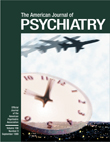Risperidone in Treatment-Refractory Schizophrenia
Abstract
OBJECTIVE: The purpose of this study was to evaluate the clinical safety and efficacy of risperidone compared to haloperidol in patients with treatment-refractory schizophrenia. METHOD: Sixty-seven medication-unresponsive subjects were randomly assigned to treatment with risperidone (N=34) or haloperidol (N=33). After a 3–7 day-placebo washout period, there was a 4-week, double-blind, fixed-dose comparison trial that was followed by a 4-week, flexible-dose phase. Measures of clinical change were quantified by standard psychopathologic and neuromotor instruments. RESULTS: Risperidone demonstrated clinical efficacy superior to that of haloperidol on the total Brief Psychiatric Rating Scale (BPRS) after the first 4 weeks of treatment. Risperidone did not show any advantage over haloperidol after an additional 4 weeks. Overall improvement on the BPRS at 4 weeks was significantly better for the risperidone group (24%) than for the haloperidol group (11%). Risperidone-treated subjects were significantly less likely than haloperidol-treated subjects to require concomitant anticholinergic medication after 4 weeks (20% versus 63%); they also had significantly less observable akathisia (24% versus 53%) and significantly less severe tardive dyskinesia. Baseline characteristics that correlated significantly with risperidone response were positive symptoms, conceptual disorganization, akathisia, and tardive dyskinesia. CONCLUSIONS: Risperidone was better tolerated and more effective in a subset of patients with treatment-refractory schizophrenia. Positive psychotic symptoms and extrapyramidal side effects at baseline appear to be powerful predictors of subsequent response to risperidone.



